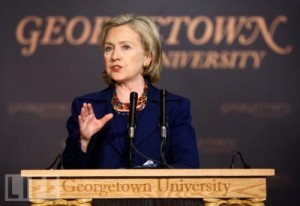We Need To 'Address The Very Real Threat Of Climate Change'
 Secretary of State Hillary Clinton is willing to break the climate silence.
Secretary of State Hillary Clinton is willing to break the climate silence.In a speech on energy diplomacy yesterday afternoon at Georgetown University, Clinton talked about the importance of sustainability and climate issues on the international policy agenda.
“We…have an interest in promoting new technologies and sources of energy – especially including renewables – to reduce pollution; to diversify the global energy supply; to create jobs; and to address the very real threat of climate change,” said Clinton.
Clinton said the world is in a state of profound change when it comes to energy, citing the surge in natural gas, the increase in the energy consumption in developing countries, and new drilling technologies that are playing a role in opening up places such as the Arctic and the South China Sea for oil extraction. She lauded improvements and expansions in renewable and traditional energy that have occurred under the Obama administration – gains that many Americans don’t realize, she said.
“Our use of renewable wind and solar power has doubled in the last four years. Our oil and natural gas production is surging. New auto standards will double how far we drive on a gallon of gas, and for the first time, we’ve introduced fuel efficiency standards for heavy trucks, vans and buses, all of which will cut costs. That means we are less reliant on imported energy, which strengthens our global, political and economic standing and the world’s energy marketplace,” she said.
Though using varied energy sources from the U.S. and abroad is important, Clinton said that renewable energy is key to the world’s economic and environmental progress, as well as its security interests.
“The transformation to cleaner energy is central to reducing the world’s carbon emissions and it is the core of a strong 21st century global economy.” she said.
Clinton outlined the work that the State Department has done over the past four years in three areas: energy diplomacy; preventing monopolies and promoting competition; and energy poverty.
Energy Diplomacy
Clinton brought up the State Department’s work dealing with drilling for oil in the Arctic – an issue she called a “potential environmental catastrophe.” She said protecting the Arctic’s ecosystem while setting ground rules to avoid conflict over the area’s oil resources is a critical part of the department’s work.
Clinton also highlighted the role of the year-old U.S. Bureau of Energy, which is charged with leading the State Department’s diplomatic efforts on energy. She said in the coming weeks, she would be sending policy guidance to all U.S. embassies, “instructing them to elevate their reporting on energy issues and pursue more outreach to private sector energy partners.”
“In the past the State Department obviously conducted energy-related diplomacy…But we did not have a team of experts dedicated full-time to thinking creatively about how we can solve challenges and seize opportunities, and now we do,” Clinton said. “That in and of itself is a signal of a broader commitment by the United States to lead in shaping the global energy future.”
Promoting Competition
In the next 25 years, the world will need up to $15 trillion in investment to generate and transmit electricity, Clinton said. Most will come from the private sector, which is a huge opportunity for American companies and workers.
“American companies are leaders in the field of energy,” she said. “And in the coming decades, American companies should have the chance to do much more business worldwide, and in doing so, they will help create more jobs.”
In addition, Clinton said this year, companies and development agencies have committed more than $50 billion in financing for sustainable energy. More than 60 companies in Africa, Latin America and Asia have begun action plans to bring energy investors to their markets, which will increase access to sustainable energy, lower the price people in these countries pay for energy and open new markets for American businesses.
Energy Poverty
Clinton cited the Columbia and U.S. initiative called, “Connecting the Americas 2022 ,” which aims to link electrical grids from Canada to Chile and the Caribbean with the goal of creating a system of energy sharing among all regions of the Americas.
“If one country has excess power, it can sell it to a neighbor,” Clinton said. “The climate variability across our region means if one country has a strong rainy season, it can export hydropower to a neighbor in the middle of a drought.”
Clinton also mentioned the Global Alliance for Clean Cookstoves, which was created three years ago and works to replace outdated and dangerous forms of cooking energy in 100 million homes worldwide by the end of the decade.
Clinton said the U.S. must be involved in all parts of the world in order to solve the challenges that the evolving energy market is facing.
“The message we’re sending with all of these efforts…is this: the United States is convinced that energy in all of its complexity will continue to be one of the defining issues of the 21st century, and we are reshaping our foreign policy to reflect that,” Clinton said.
You can return to the main Market News page, or press the Back button on your browser.

